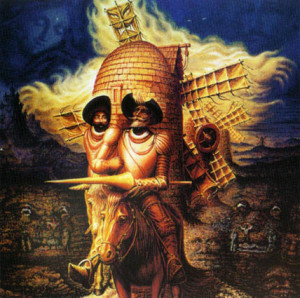Where do I begin…
Within this reading, we have been introduced into another frame tale. We are now deeper down the rabbit hole. The story comes to us in a very interesting fashion actually. Once our group returns to the inn, everyone minus the very tired Don Quixote, stays awake for supper. The talks of knight’s errant comes up and the women of the inn start detailing how much they love to listen to chilvalric novels, and how they all join together to read them.
The innkeeper explains that someone had left some novels and manuscripts there by mistake, and that he, the innkeeper, planned to return them to him like a good Christian. Nevertheless, the priest asks to see these novels.
Inside the chest, or what-have-you, the priest finds two novels, a manuscript of about eight pages, and a historical record of some king and army. The priest immediately advises to burn the novels of chivalry and keep the historical record for it is true. The innkeeper protests, “If you want to burn one, let it be the one about the Great Captain and that Diego Garcia; I’d rather let a child of mine be burned than either one of the others” (269). In the face of a priest, this innkeeper would rather keep his novels of chivalry over the one the priest deems worthy of reading. The innkeeper emphasizes his love for the novels by being willing to sacrifice one of his own children to keep his beloved novels closer to him.
This is an important moment in the book: a person preferring to keep a chivalric novel over historical document. Immediately after the innkeeper discloses his preference and protests against the burning of books, the priest goes into a long monologue of how great the two leaders in the non fiction book were. This is for naught, because the innkeeper comes back with even more exciting and dashing actions made by the knights in the novel. “By God, your grace out to read what Felixmarte of Hycania did” (269), the innkeeper says recalling the great knight. It is made apparent that the innkeeper actually believes these novels of fiction. “He believes that everything these books say really happened just as written” (269), says Cardenio. And certainly the innkeeper does.
However the innkeeper isn’t a Don Quixote. He doesn’t see it necessary to give up his place in society to be like those knights he read about. After the priest’s warnings, the innkeeper says, “I wouldn’t be crazy enough to become a knight errant; I see very well that these days are different from the old days, when they say those famous knights wandered through the world” (271). So the innkeeper is sane enough to let the history of knights be in the past; he doesn’t see a need for knight errant in the present, and in this way the innkeeper isn’t a Don Quixote.
Nevertheless, a very important point is discussed within this passage. Things are changing within the novel, people believing/seeing/acting the opposite of what they should, things turning out not to be as they appeared, and what is reality? and does it matter? And as these notions are changing within the characters, we, the readers, are supposed to question the very things we take for granted, and the things we take for absolutely true. Because I’d argue that the innkeepers stance on truth is much more advanced than the priests. What the innkeeper represents is the freedom to derive meaning. The choice to see things as we wish. The innkeeper is a good representation of a good reader. Because it is true that validity isn’t worth a damn, and truth is worth everything. And what is this truth? What is it that we seek in the world? To lay claim to an answer I’d say it’s to be the best human we can be, plain and simple. And the innkeeper finds his meaning of life in the acts of these fictional knights. We find an honest business owner believing more in the imagination than the historical. And yet, he isn’t an “evil” or “bad” character or man.
Because the truth is, how do we know that what we know from non-fiction books are true. There is no empirical evidence that proves one book to be truer than the other. They are both paper, ink, binding, etc. They are physically the same and yet hold different truth values because someone else says so. Uh huh, I’m not going to take that. I’m going to take the one that speaks to me the most; the one that teaches me the best.
So here we are, our characters are starting to differ in what they believe. They are choosing their own meaning. Why Don Quixote needed to dress up as a knight and right wrongs is beyond me for now.
Next time…
